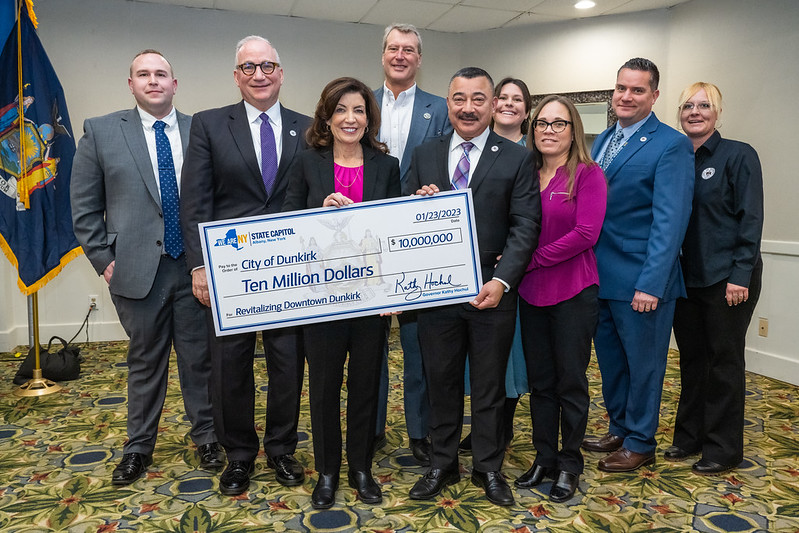
Gov. Hochul delivers a check (photo: Darren McGee/Governor's Office)
Here’s a story you’ve probably heard: A CEO donates $50,000 to a state governor’s political campaign. Not long after, the CEO’s company gets a $50,000,000 contract from the state. A reporter asks the politician if it was pay-to-play, and the governor’s office says: “No donation of any size has any influence on the governor’s decisions – period.”
The politician may truly believe this, but a substantial body of research suggests the opposite: When people receive a gift, they want to return the favor. Reinvent Albany’s new report, “Buying Influence Works,” details at least 13 studies showing that corporate gifts for politicians are usually followed by political gifts for corporations. For a state like New York where business executives are free to donate up to $18,000 to the Governor while bidding on state contracts, the implications of this research are dire.
While there is plenty of evidence that gifts influence politicians, there is even more showing that drug companies influence doctors. Researchers have spent three decades thoroughly documenting the pharmaceutical industry’s efforts to influence physicians. Thanks to their research, it is now well known that gifts and payments from drug companies cause doctors to prescribe more of those companies’ drugs and use more of their equipment. Studies funded by drug companies also tend to produce findings those companies like.
Drug manufacturers market their products to doctors through a process known as “detailing.” Drug company representatives go to the doctor’s office and bring some sandwiches for the doctor and her entire staff. As the doctor eats her sandwich, the representative explains the medication (or artificial knee, hearing aid, etc.) to the doctor and addresses any concerns. Now the doctor is more familiar with the product, and she has a full stomach to boot. (Though the practice is not as common as before, ‘detailers’ also sometimes give away branded swag – pens, totes, baseball hats, coffee cups – to keep their product fresh in the doctor’s mind.)
Does detailing work? Without a doubt. One study found that even a single meal from a drug company made doctors more likely to prescribe that company’s drug, and another that doctors receiving meals from drug companies prescribed that company’s drugs at rates up to 5.4 times higher than before. Reviewing the literature, Reinvent Albany could not find a single study showing no correlation between free meals for doctors and an increase in prescriptions (though still prevalent, detailing is less pervasive than it used to be).
In the research field, one of the worst actors has been Big Tobacco, which produced mountains of pro-smoking studies after concerns about cigarettes’ health impact emerged in the 1950s. Unsurprisingly, 94% of reviews by researchers affiliated with Big Tobacco produced positive findings for the industry, compared with 13% of independent reviews. When controlling for factors such as article quality or peer review, the odds that an industry-affiliated author’s study would favor Big Tobacco were 88 times higher than for non-affiliated authors. Soft drink producers and gas companies must have been taking notes.
Like politicians, many doctors and researchers deny that they’re influenced by gifts. One survey had only 8% of doctors saying small branded gifts could affect their habits. When a pharmaceutical company paid for physicians’ trip to a symposium at a luxury resort, nine of out of ten doctors said the trip would have no effect on their prescription habits (the study, of course, found otherwise). And like politicians, physicians will acknowledge the problem of pay-to-play while claiming they themselves are immune: One survey had only 39% of medical residents acknowledging that gifts could influence their prescriptions, while 84% believed other physicians are susceptible.
What does this research say about New York State? We know that the 2022 gubernatorial election was one of the most expensive in state history, and many of the largest donors had business before the state. Elected officials claim that large contributions have no bearing on state decisions, but even if that’s true, the appearance of corruption – not to mention the state’s countless pay-to-play scandals – continues to undermine the public’s faith that the government is working for the people, not wealthy donors.
New York City understands the obvious risk of pay-to-play and limits campaign contributions from people doing business with the city to $400 for mayoral candidates and $250 for City Council candidates. Embarrassingly, New York State has not passed a single law to control this kind of behavior. As of 2023, CEOs seeking contracts from the state are free to donate up to $18,000 to Governor Kathy Hochul, $10,000 to State Senators, and $6,000 to Assembly Members.
State leaders need to do much better. They can start by passing Senator Zellnor Myrie’s common-sense bill, S6247, which prohibits business executives from contributing to the Governor while seeking contracts from the state. It’s a strong first step to win back the public’s trust.
***
Tom Speaker is a policy analyst at Reinvent Albany. On Twitter @RealTomSpeaker & @ReinventAlbany.
***
Have an op-ed idea or submission for Gotham Gazette? Email This email address is being protected from spambots. You need JavaScript enabled to view it.




